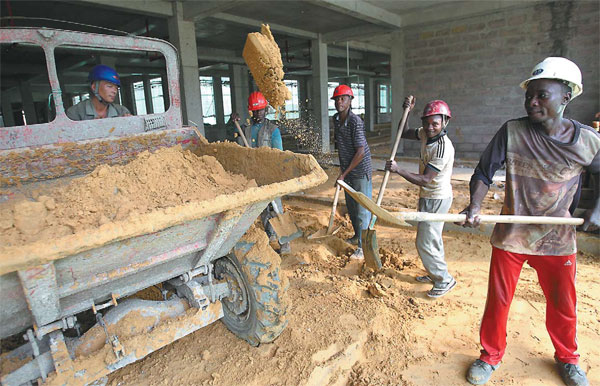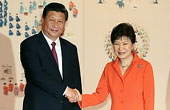Changing the face of Brazzaville
By Li Fangchao and Joseph Catanzaro (China Daily Africa) Updated: 2014-07-04 09:51
|
Chinese and Congolese workers of the Weihai company are racing against time to build the athletes' village for the All-Africa Games in Brazzaville next year. Photos by Zhang Wei / China Daily |
From a futuristic airport to an athletes' village, Chinese firm's hard work is easy to spot.
It is the kind of building apt to make an impression, which is a handy attribute for any city or country wanting to attract visitors. This is the new terminal building of Maya-Maya Airport in Brazzaville, capital of the Republic of Congo, an edifice dominated by steel and glass, and whose roof looks like a giant aircraft wing flap fully extended.
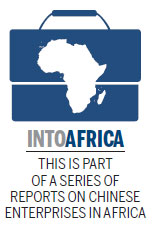
The airport's makeover, including an extended runway, by a Chinese company over the past three years has given the city and the country added confidence that it can become a transport hub for Central and West Africa.
Li Junhai, general manager of Weihai International Construction Engineering Co Ltd (Congo), beams with pride when he talks about his company's role in modernizing the airport, work that was completed in February.
The terminal, covering more than 90,000 square meters, is designed to handle more than 2 million passengers a year. Construction began in 2007 and cost more than $180 million, those funds coming from a low-interest loan from the Export-Import Bank of China.
Denis Sassou Nguesso, president of the Republic of Congo, attended the completion ceremony, Li says.
"He recognized what we are capable of and praised our work," Li says.
Since Weihai entered Congo in 1998 with donation projects it has expanded greatly and left many trademark projects in the country.
"More and more Chinese companies are arriving in Africa every day," Li says. "Many no longer start with donation projects, and I think that illustrates how Africa is opening up to China."
Besides the airport terminal, Weihai has built 10 stadiums in almost all the main cities of each province, Li says.
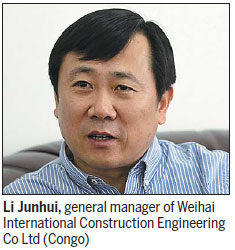
"African people love soccer. Some small cities choose to do without other facilities, but they don't want to do without a stadium."
Congo is an important chain in Weihai's global activities, and the company is working on projects worth a total of $500 million in Congo, he says.
One of the largest is six blocks of apartment buildings to serve as an athletes' village for the 11th All-Africa Games in Brazzaville next year.After the games, the buildings will be turned into student dormitories for a university.
Yu Qinghua, the project manager and deputy general manager of Weihai in Congo, says his team is racing against time to meet the deadline.
"Lack of skilled local workers is always a problem, and we are always recruiting."
Each Chinese worker is responsible for training at least two new Congolese workers, he says.
There is no quota for the number of locals the company must employ, but there are minimum-wage regulations.
"The minimum wage is $4 a day. We pay $5 a day on average. It's also performance based. For workers with skills who work hard we pay a lot more."
Good Congolese workers can earn about 3,000 yuan ($480) a month, he says.
Wang Fushun, in charge of placing workers on the site, says the working environment is almost the same as in China. But malaria is sometimes hard to avoid on the construction site, only a few hundreds meters from the Congo River.
"Some of the Chinese workers can't bear it here and go home, for example those who catch malaria," says Wang, 45, from Shandong province.
Wang says he can earn a little more than in China and can save most of the money because food and accommodation are all covered by the company.
"Basically, you don't have any place to spend money."
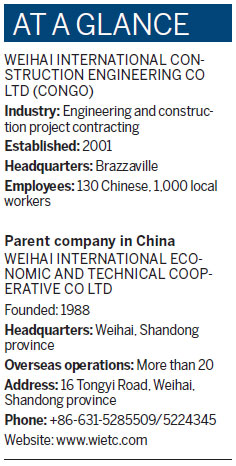
Ibata Serge Osee, a manager with Weihai, has worked with the company since it was founded. He has found the way Chinese companies recruit staff is different to that of other foreign firms, he says.
"If a French company hires you it's because you have a particular set of skills already. But a Chinese company will hire you even if you know nothing. They will train you, and you can then rise in the company."
Chinese companies such as Weihai, have brought huge change to Congo in terms of infrastructure, Osee says.
"Chinese companies will take difficult jobs in harsh conditions at a lower price. They get respect because they work closely with locals."
Passy Ntoumba, a Mandarin teacher at Brazzaville Middle School and a part-time translator at Weihai, says more and more Congolese children have begun to learn Chinese.
Ntoumba, 53, who learned Chinese through an exchange program in Beijing from 1984 to 1988, says he found nobody to talk Chinese with when he returned to Brazzaville after graduating.
"Apart from the Chinese medical team and the embassy, there were very few Chinese back then."
But an increasing number of Chinese companies arrived in the late 1990s and things have changed greatly. The number of enrollees for his Chinese class at Brazzaville Middle School keeps rising, he says.
Language skills have become an advantage in finding work, and Ntoumba has found some of his good students work on Chinese construction sites.
"Now all the parents and children know they can easily find a job after learning Chinese."
Li Junhai, the general manager of Weihai, says the company is trying to diversify its investment in Congo to prepare for changes in the infrastructure market.
Business is still booming for Weihai and other Chinese construction companies, but the market may be saturated in five years, he says.
"We face very fierce competition here. It's hard to say what the future holds."
Li says BOT (build, operate, transfer) is a good operational model that Weihai is trying to explore.
"We will build it, we will operate it and after a certain amount of time we will transfer it."
Contact the writers through lifangchao@chinadaily.com.cn
(China Daily Africa Weekly 07/04/2014 page8)
